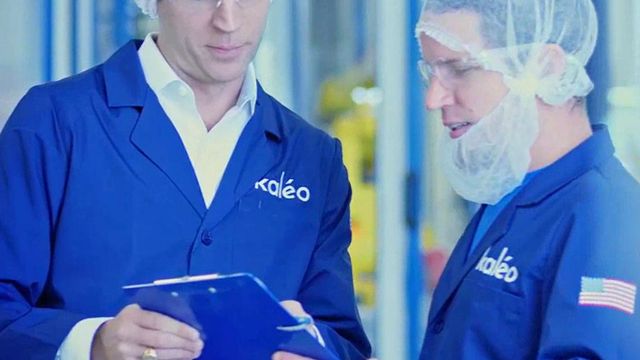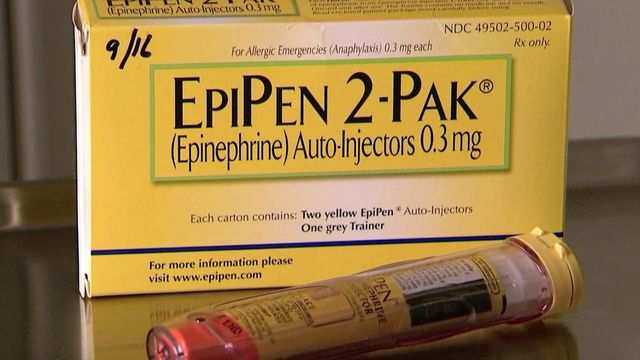FDA approves generic EpiPen that may be cheaper
The Food and Drug Administration on Thursday approved the first generic version of EpiPen, providing new competition that could help drive down the cost of a lifesaving product that had become a notorious symbol of high drug prices.
Posted — UpdatedThe Food and Drug Administration on Thursday approved the first generic version of EpiPen, providing new competition that could help drive down the cost of a lifesaving product that had become a notorious symbol of high drug prices.
The generic copy is made by Teva Pharmaceuticals USA, and will rival Mylan, which had come under intense criticism for raising the price of its EpiPen sixfold since buying it in 2007. Mylan’s device has been plagued by periodic shortages, with consumers scrambling again in recent months to find a reliable supply.
The drug-device product is an epinephrine auto-injector, which can be used for treatment of life-threatening allergic reactions to such things as peanuts and bee stings, in adults and children who weigh more than 33 pounds. Teva was approved to market the generic version in 0.3 mg and 0.15 mg strengths.
Scott Gottlieb, the commissioner of the FDA, who had talked during his Senate confirmation hearing about planning to speed approval of some generic products to lower costs, said he was pleased with the timing.
“It’s a very important approval in advance of back-to-school season, when parents go out and buy these products,” Gottlieb said. “This approval means patients living with severe allergies who require constant access to lifesaving epinephrine should have a lower-cost option, as well as another approved product to help protect against potential drug shortages.”
It seemed doubtful that Teva would have the product ready for sale in the next few weeks when school begins. A company spokeswoman declined to say when it would be available, or how much it would cost.
“We’re applying our full resources to this important launch in the coming months and eager to begin supplying the market,” said Doris Saltkill, a spokeswoman, in an email.
But consumers will eventually be able to have it substituted for the Mylan EpiPen at the pharmacy. Mylan has raised the price from under $100 to more than $600 for a set of two injections.
The EpiPen is designed to automatically inject a dose of epinephrine into a person’s thigh to stop an allergic reaction. Epinephrine works by reducing swelling in the airway and increasing blood flow in the veins.
Jennifer Madsen, head of federal advocacy for the Food Allergy Research & Education advocacy group based in Virginia, said about 15 millions Americans, including six million children, have food allergies. Of those, Madsen estimated that potentially 2.4 million children have had a life-threatening incident. Her organization has pushed the FDA to approve a generic EpiPen for a long time.
“We’re very excited to have this big win for the food allergy community,” she said. “Particularly in view of this national shortage.”
In May, after scores of consumers reported that they couldn’t buy EpiPens, the FDA announced there were shortages of two types of epinephrine auto-injectors, including Mylan’s EpiPen, and Adrenaclick, made by Impax Laboratories. The agency attributed the shortages to manufacturing problems. Another brand, called Auvi-Q, was available, but was not covered by as many insurance policies. The EpiPen has had a troubled history. Mylan itself, stung by congressional inquiries and criticism, released its own generic version that costs about half as much. In August of last year, Mylan announced that it had finalized a $465 million settlement with the Justice Department about claims that it overcharged the federal government for the product.
Last September, the FDA accused the drugmaker Pfizer, which manufactures the EpiPen for Mylan, of failing to properly investigate reports of EpiPen malfunctions, including cases in which patients became severely ill or died after the device did not work. An FDA warning to Pfizer said that Meridian Medical Technologies, which is a unit of the drug giant, did not adequately examine problems with a critical component of the EpiPen, the mechanism that insures that it fires and delivers the proper dose.
At the time, a Pfizer spokeswoman said the company was confident in the EpiPen’s safety and efficacy, and said it had no information to indicate that there was any causal connection between the product complaints and any patient deaths.
Related Topics
• Credits
Copyright 2024 New York Times News Service. All rights reserved.






